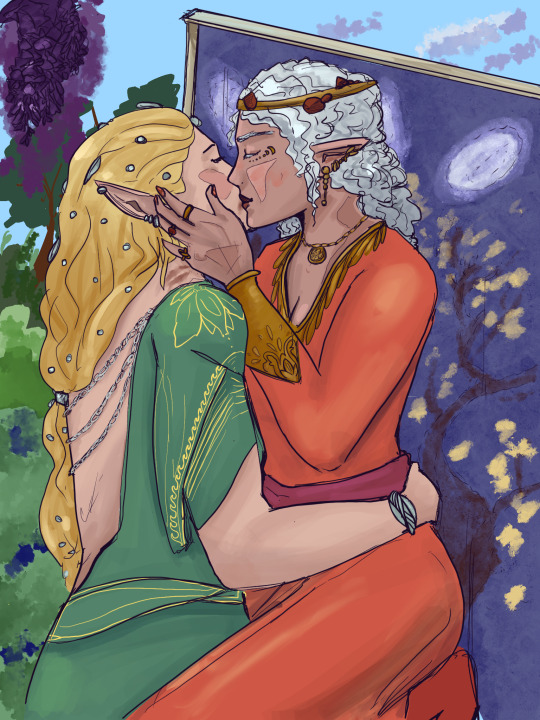#indis
Text
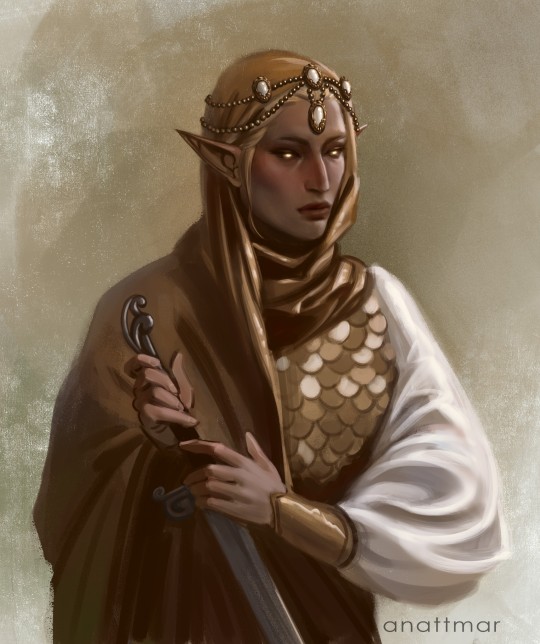
Queen Indis🫡
#the silmarillion#silm#tolkien#indis#my queen#do not mistreat#i gave her a sword#sketch#fanart#illustration#art
744 notes
·
View notes
Text
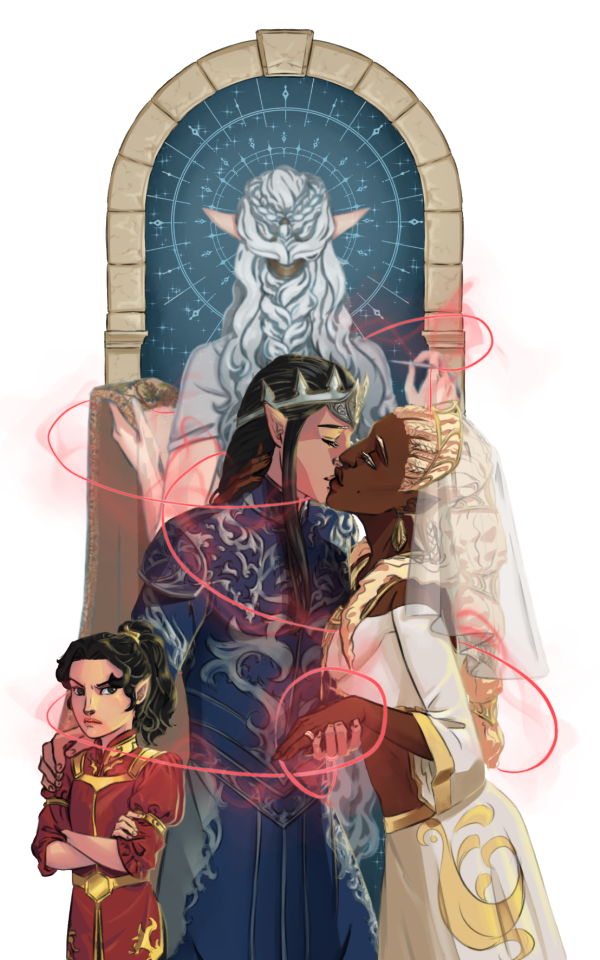
Marriage of Finwë
...and the thread of destiny is spun ever on.
aka Fëanaro is not impressed :) Not-so-transparent ghost Miriel under the cut

#my art#feanor#finwe#house of finwe#indis#tolkien#silmarillion#miriel#Míriel Þerindë#tapestry of time#this took me an embarrassing long time#but hey at least I have now a Finwe and an Indis design#weeeh
699 notes
·
View notes
Text
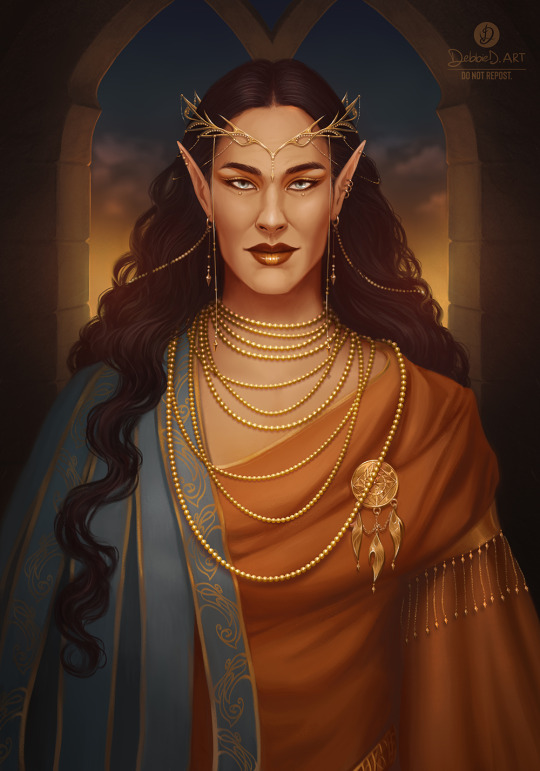
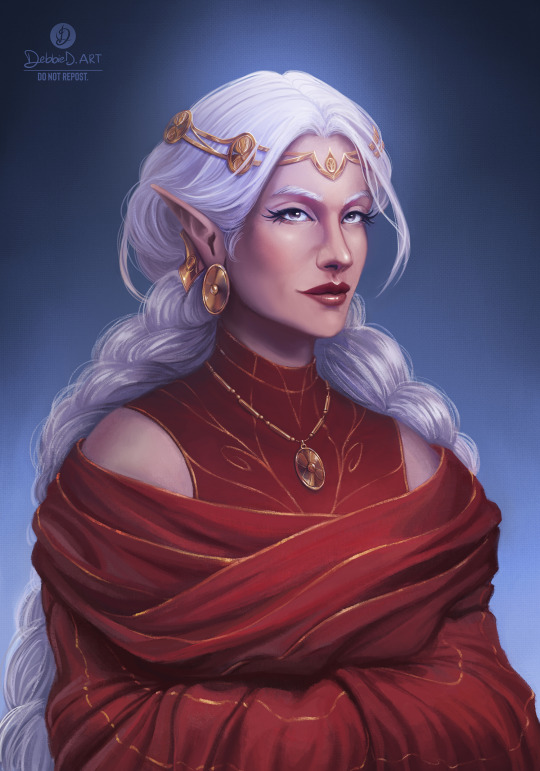

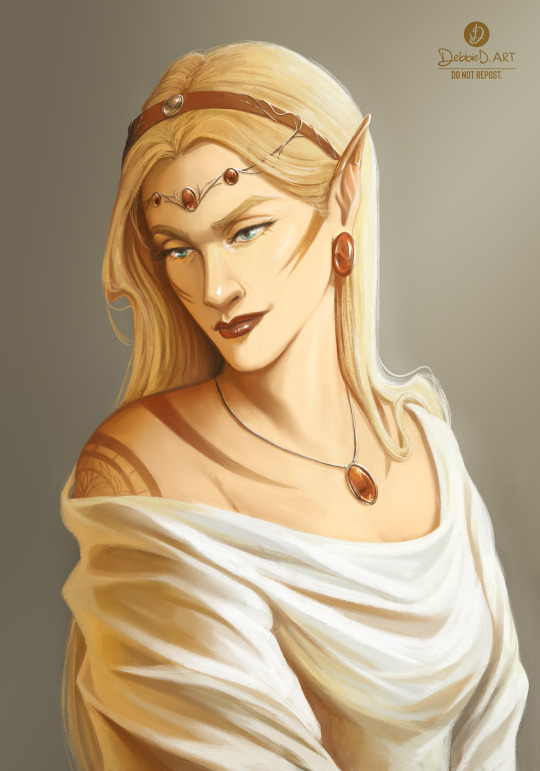

House of Finwë ~
Finwë - Miriel - Indis - Findis - Lalwen
// prints!
fëanorians: 1 - 2 - 3
nolofinwëans: 1 - 2 - 3
arafinwëans: 1 - 2 - 3
#finwe#miriel#indis#findis#lalwen#irime#feanor#fingolfin#finarfin#noldor#elves#tolkien#silm#silm fanart#silmarillion#lotr#lord of the rings#portraits#digital art#middle earth#jrr tolkien#silm art
284 notes
·
View notes
Text
Indis appreciation post!
Disclaimer: All the canon info is taken from Morgoth's Ring and Peoples of Middle Earth. Also, this isn't a character analysis/meta. It's just a list of stuff I love (plus some headcanons) about one of my favorite characters in the legendarium.
1. She's athletic and outdoorsy. We're told that Indis is "exceedingly swift of foot" and that "she walked often alone in the fields and friths of the Valar, turning her thought to things that grow untended." When Finwe sees her, she's chilling on a mountainside. I love that she's associated with nature, specifically the wilderness. She parallels Feanor in her exploration of Aman and interest in the imperfect. Also, this is purely self-indulgent but ever since reading HoME for the first time, I've pictured Indis as tall and broad, and muscular beneath a layer of fat.
2. She doesn't let her unrequited love affect her life. "There was ever light and mirth about her." She's not the pining, languishing princess stereotype. She goes on. She doesn't let it make her bitter or depressed, and she is so restrained that only Mandos and possibly Ingwe are aware of her feelings.
3. Part of her attraction to Finwe is intellectual. In HoME we're told that his "mastery of words delighted her." Considering that Indis is also a poet/composer ("wove words into song") and that the Vanyar enjoy linguistics, it makes sense. It's also just really cute.
4. She's politically minded. Her reasoning for pronouncing 's' instead of 'th' is: "I have joined the Noldor, and I will speak as they do." This is the right thing to do to gain the respect of the Noldor and their acceptance of her authority. I also think she makes a statement with Fingolfin and Finarfin's mother-names. Arakano ("high chieftain") and Ingoldo ("the Noldo, eminent among the kindred") are not only powerful, prophetic names, they're also strikingly similar to Ingwe ("chief of chieftains") who is the High King not just of the Vanyar, but all Eldar. What a power move.
5. She's able to balance her own culture with the culture she marries into. Indis integrates into Noldorin society easily while remaining Vanyarin at her core, as is evidenced by Finwe saying that "above all her heart now yearns for the halls of Ingwe and the peace of the Vanyar." Her sons also respect and are proud of their mixed heritage; Finarfin "loved the Vanyar, his mother's people" and is said to be like them (as are Finrod and Galadriel), and Fingolfin's daughter-in-law is Vanyarin (plus the Nolofinweans have a special connection to Manwe).
6. She gets an awesome prophecy about her line. "But I say unto you that the children of Indis shall also be great, and the Tale of Arda more glorious because of their coming. And from them shall spring things so fair that no tears shall dim their beauty; in whose being the Valar, and the Kindreds both of Elves and of Men that are to come shall all have part, and in whose deeds they shall rejoice. So that, long hence when all that here is, and seemeth yet fair and impregnable, shall nonetheless have faded and passed away, the Light of Aman shall not wholly cease among the free peoples of Arda until the end." Fuck yeah.
7. Her name means "valiant woman." This is the only definition given in Morgoth's Ring, I believe. I highly prefer it over the "bride" meaning because it's a badass name and is similar to Artanis ("noble woman") and Astaldo ("the valiant"). A headcanon that I'm particularly attached to is that Indis's mother-name is Indome, meaning "will of Eru."
8. She's popular with most of the Noldor. We're told that "Finwe, King of the Noldor, wedded Indis, sister of Ingwe; and the Vanyar and Noldor for the most part rejoiced." The majority of the Noldor also follow Fingolfin and Finarfin instead of Feanor.
9. She's friends with Nerdanel. HoME states that Nerdanel went to "abide with Indis, whom she had ever esteemed."
10. She gets pissed off at Finwe when he sides with Feanor. So much so that he thinks she won't want to see him if he's re-embodied. I know this is from his perspective but I'm inclined to agree. [However, this is still very presumptive of him, and his comment that "Indis parted from me without death" is super shitty. Eugh.]
11. She's close to her kids. Finarfin takes after her, Fingolfin passes on the name she gave him, Findis lives with her, Lalwen goes by the name she gave her. Finwe also says that "she hath dear children to comfort her."
So there we have it! What little info we get about Indis is pretty awesome. And this is just a list; I could write a whole essay on her fortitude and unconventionality and my numerous headcanons about her.
227 notes
·
View notes
Text

love is love silmaril is silmaril
#silmart#beren and luthien#the silmarillion#russingon#beren erchamion#luthien tinuviel#maedhros#fingon#miriel#indis#morgoth#in that order.#ok i'm done working on this i'm going to send it out before i think too much about it. have fun besties.#tolkien#my art
267 notes
·
View notes
Text
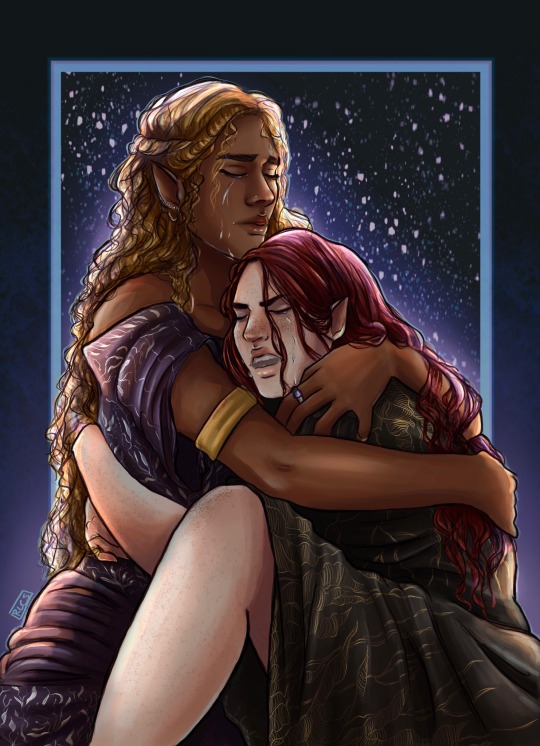
To them the rage, to us the pain
#indis#nerdanel#the silmarillion#the silmarillion art#my art#forestials art#mmmm indis gets it#agonisingly so
558 notes
·
View notes
Text
Please read this Morgoth's Ring quote with me cuz this is PEAK Fëanor and Fingolfin angst potential:
[[This is Finwë talking to the Valar about Indis]] "But Indis parted from me without death. I had not seen her for many years, and when the Marrer smote me I was alone. She hath dear children to comfort her, and her love, I deem, is now most for Ingoldo. His father she may miss; but not the father of Fëanáro!"
Those familiar with only the Shibboleth's list of quenya names might assume that this is referencing Finarfin, but no. At this point in the story, Ingoldo was Fingolfin's mother-name. This quote implies that, according to Finwë's observations, Fingolfin was Indis's favorite child.
SO IMAGINE; Fëanor, who loves his mother so dearly and so desperately, but never knew her, and therefore never felt her love in return, looking at Fingolfin, who gets the favoritism and motherly love that he craves yet never got. Imagine how jealous and furious that might make him, especially since he hates Indis so much. I can't help but wonder if Fingolfin's being his mother's pride and joy was one of the reasons why Fëanor seemed to hate him the most of his half-siblings.
331 notes
·
View notes
Text
Anaire: “So how’s life with a baby?”
Nerdanel: “Exhausting. I didn't know that it was possible for someone to cry this much.”
Indis: “Oh, I’m sure he’ll grow out of it soon.”
Nerdanel: “Oh no, no, no, no. The baby’s an angel, he’s no trouble at all.”
Earwen: “...But you just said-?”
Feanor, holding baby Maitimo and crying: “Nerdanel, I love him so much!”
372 notes
·
View notes
Text
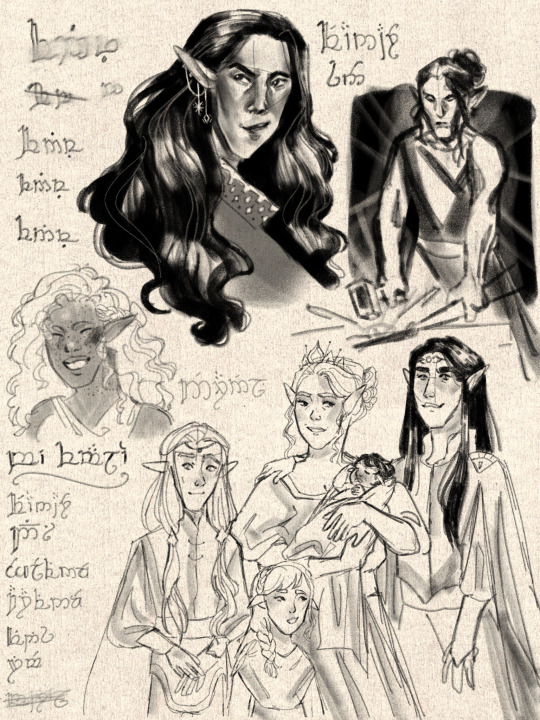
Here’s my artwork for @silmarillionepistolary day 4, love and creation!
More time has passed, and Finwë still loves his art, his people, and his growing family. His eldest son, Fëanáro (shown on the top left and right), has grown into an ambitious and genius adult. He is always creating and inventing new things - even a written language! Finwë has spent much time learning the script (a few failed attempts are shown in the top left corner), but he is immensely proud of his son (and his wife, Nerdanel, pictured below him).
Finwë’s ‘other family’, so called by Fëanáro (who doesn’t get along with them at all), has grown over the last several years. Indis is a ray of sunshine in his life, and as strong a woman as she is a Queen - she has borne four children and remains as joyful and sturdy as ever. Nolofinwë is the eldest, followed by Arafinwë, then his two daughters Findis and Írimë. Finwë adores children, and would love to always have them near him forever. (Though his own are swiftly growing up, Nerdanel is already pregnant with her first child, which is very excited about).
Still, though his first wife makes no more appearances in his sketches … she always lingers in the back of his mind, a phantom he could not erase even if he wanted to. And he doesn’t want to, no matter how much guilt he feels about pining over Míriel when his living wife is ever beside him.
Tengwar translations (the language is English transcribed into Tengwar):
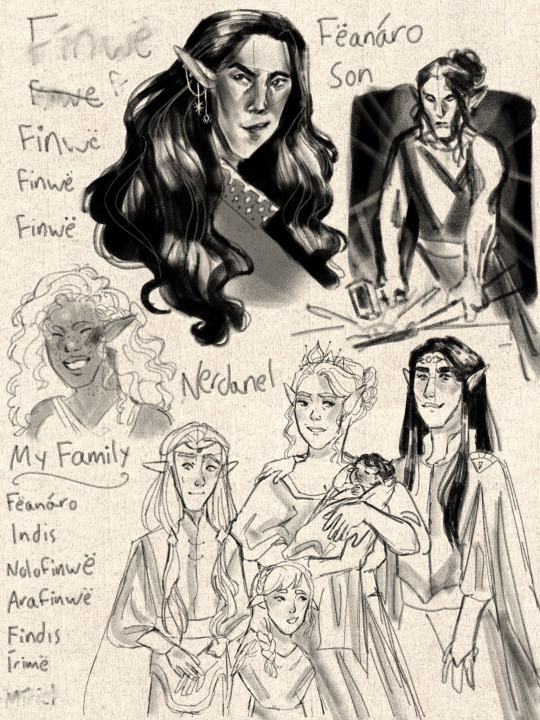
#lord of the rings#art#my art#the silmarillion#finwe's sketchbook#finwe#house of finwe#silmarillion epistolary#indis#Fëanorian#nerd#fingolfin#finarfin#findis#irime lalwen#fandom event
103 notes
·
View notes
Text
Conditions sound ripe for every single one of Finwë's children and grandchildren to have a complex about never being enough and needing to prove their right to exist.
"...many saw the effect of this breach within the house of Finwë, judging that if Finwë had endured his loss and been content with the fathering of his mighty son, the courses of Fëanor would have been otherwise, and great evil might have been prevented...But the children of Indis were great and glorious and their children also; and if they had not lived the history of the Elder would have been diminished" (Ch 6, The Silmarillion).
Yes, this sounds like the narrator's justification of Indis' marriage and her descendants' right to freaking exist but it is justified on account of their actions, not their personhood.
With this quote it's most obviously Indis' descendants, but this applies to Feanor too: feeling like he has to be the best and the greatest to make up for "causing" his mother's death.
If such a view was prevalent--what if they all felt like they had something to prove; what if they all felt like they needed to make their mark on the world to prove that they had a right to exist?
What if they all believed that they had to do something great, something more epic than anyone could've imagined, to make their existence worthwhile, to balance out the damage that their existence created?
213 notes
·
View notes
Text
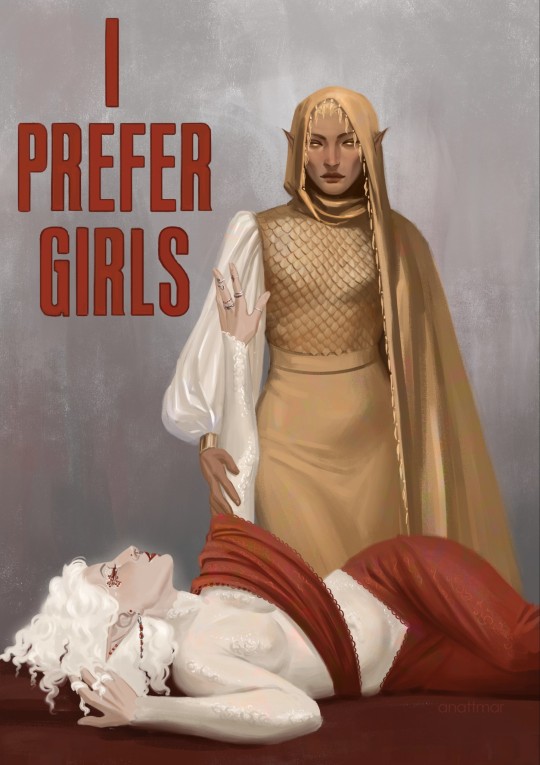

no but that's literally them
[artist of the original illustration is Robert Maguire]
#the silmarillion#silm#tolkien#indis#míriel#miriel therinde#indis/míriel#finwë is hyping them up#redraw#fanart#illustration#art
504 notes
·
View notes
Text
concept i've been thinking about lately: feanor writes all his notes in conlangs. so no one else can understand them, of course. except sometimes, he can't understand them either. this is the real reason why the silmarils were a one time thing.
#imagine: ñolo tries to sneak into feanaro's office and get his notes to figure out what hes working on and he just#cant understand any of it#iconic#tell me feanor wouldnt do his#and he would keep a journal where he talked shit about his brothers and indis also in conlangs#and eventually ñolo finds the key/notes for one of them and learns it#and just casually greets 'naro in it one day#and feanor's just like 👁️👄👁️#i love them your honor#feanor#feanaro#sons of finwe#nolofinwe#arafinwe#fingolfin#finarfin#indis#miriel#finwe#silm#silmarillion#tolkien#valinor#silmarils
250 notes
·
View notes
Note
Can I request chubby Indis?
Certainty! Here is the golden mama 😌✨ and her smol beans!
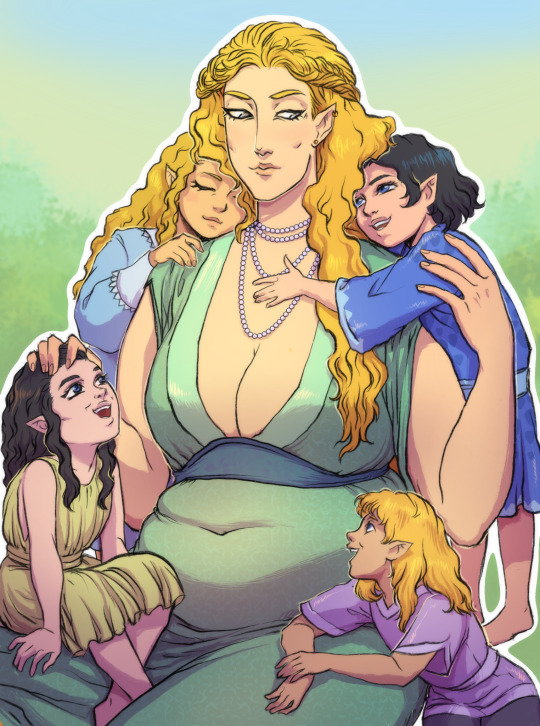
166 notes
·
View notes
Text
Imagine if Fëanor and Indis actually got along really well.
I know that most people perceive that he hated her because she 'replaced' Míriel, but just imagine that they somehow managed to talk everything out and then get along and maybe even become friends.
But they still make a joke of pretending to hate each other when other people are around. And in private they make up insults to throw at each other when they're at the next family party, out of fun.
However, they make the insults so absurd that they make the others laugh. The two try to heal their somewhat broken family with that.
I think Finarfin would notice it first. But Fingolfin would also realize it, because Fëanor started to call him 'little brother' instead of all the 'nice' nicknames that he had normally for him.
▪︎ ▪︎ ▪︎
Finwë: Can you two at least pretend to get along?
Fëanor & Indis, who pretend to not get along: ...
138 notes
·
View notes
Text
During the Years of the Trees, the House of Arafinwe has a weekly family breakfast together– Arafinwe bakes pancakes for everyone (with his kids helping of course!) Nolofinwe and his family come to spend time together, Findis and Lalwende show up every week, even if they are a little late, and Finwe and Indis almost always make time for it as well. (And if some of Feanaro's kids show up, Arafinwe always makes a little extra) It started when Findarato was really little, and always begged for pancakes and jam, and has been going for centuries by the time Feanaro gets exiled to Formenos. They put all sorts of toppings out on the table and spend the morning catching up and laughing with each other. Treelight pours in through the windows of the house, and all is right with the world.
And one day, not too long after the Darkening, Arafinwe wakes up, disoriented, and, pretty much on auto-pilot, goes to make pancakes. Look, it takes a lot of batter to make enough pancakes for fifteen people– you have to start that early to get in done in time for a reasonable breakfast. So he makes the pancakes alone, not really thinking about things, probably unconsciously assuming that he's just woken up early and that his kids and wife are still sleeping. He sets the table, because he knows where everyone will sit. He gets everything out, because for all that's happened the pantry is still full.
And then he sees the way the slightly eerie red-tinted lamp light reflects on the silverware. And then he remembers that his children left, and so did his brothers, and sister, and nieces and nephews. He remembers the horrible, half-regretful, half-knowing look he'd seen on Findarato's face before he'd left over the Helcaraxe, the breathless, fruitless argument he'd had with Nolofinwe. He remembers that his wife won't talk to him, and neither will Findis. That his father is dead and that his mother left for Lorien after his death and isn't taking visitors.
And he just sits there, in the big, dark, silent, empty room. And the pancakes get cold and the fruit toppings begin to rot. He leaves– he's not sure when, without the treelight to tell time– and locks the room.
He moves out of his house the next day, and into the palace in Tirion, which, to be honest, feels just as haunted. He stops baking. Being high king of the Noldor in Valinor doesn't leave him with a lot of spare time for his craft. Or his grief. And as long as he keeps it locked away in a house he never goes to, he can almost live with that.
#silmarillion#silm headcanons#finarfin#house of finarfin#fingolfin#finwe#indis#earwen#findis#lalwen#finrod#but like#all of these people are here as absences#I have many thoughts about Finarfin#most of them are really sad
69 notes
·
View notes
